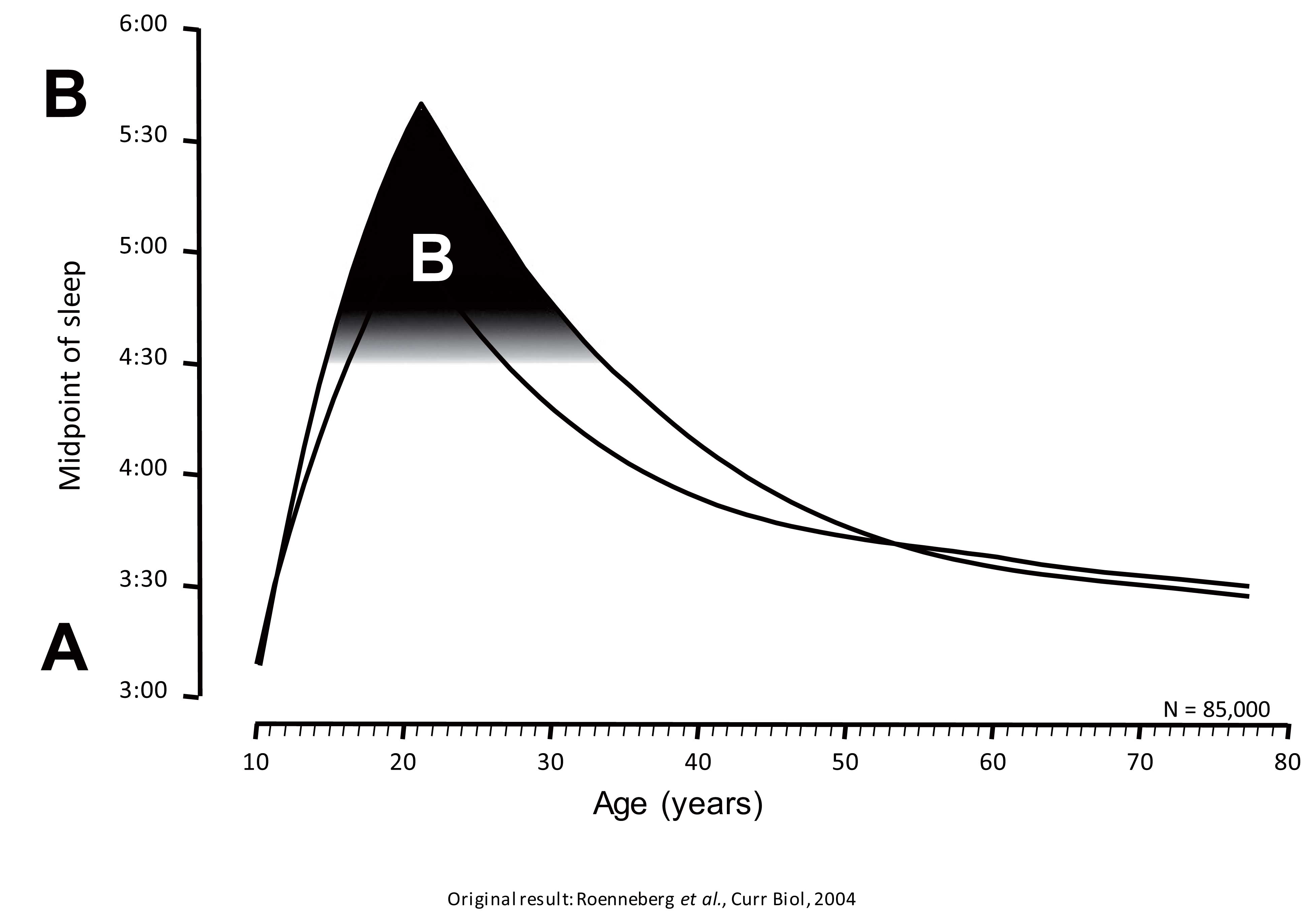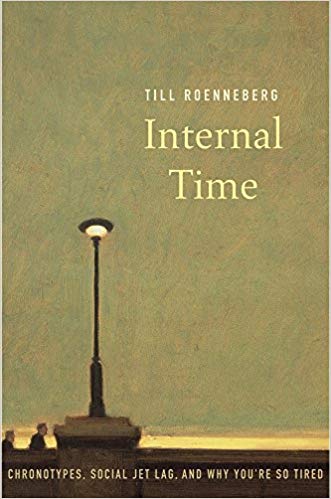YOU ARE BORN WITH A BIOLOGICAL RHYTHM.
IT’s not something you choose
CHRONOBIOLOGY
The B-Society is based on the research field of Chronobiology.
Chronobiology is the study of our “internal clock,” also known as the circadian rhythm. Our circadian rhythm establishes our preferred times for sleeping and waking, along with our peak performance times.
In 2017 Jeffrey C. Hall, Michael Rosbash and Michael W. Young were awarded the Nobel Prize in Medicine for discoveries about the molecular mechanisms controlling the body’s circadian rhythm. Professor Till Roenneberg, a leading researcher in chronobiology at Ludwig Maximilian University of Munich, has mapped the circadian rhythms of more than 300,000 people.
The distribution of circadian rhythms (chronotypes) ranges from people preferring to rise extremely early (early chronotypes) to people preferring to go to bed extremely late (late chronotypes), just like the human being ranges from being very tall to very short.
A-PERSONS PREFER TO WAKE EARLY
If you are an A-person, you wake up early. You have the best energy of the day when you wake up. You can go directly from bed to work. A-persons generally have a good life from Monday to Friday. Society supports your rhythm – childcare institutions, schools and workplaces support your rhythm. But Friday night – when you get your B-persons friends over for dinner and they don’t go home. If you go to bed at 2am, you will still wake up early Saturday morning. As an A-person you will always wake up early. You have one sleep window – one fixed time where you can sleep. Your sleep-wake cycle is not very flexible.
B-PERSONS PREFER TO GO TO BED LATE
If you are a B-person, you prefer to go to bed later and rise later than an A-person. In the morning, you have a lower body temperature than an A-person, and a few hours may therefore pass after waking before you feel refreshed. Even though you go to bed at 10 P.M., you may not be able to sleep because you are not yet tired. You become tired when your biological clock tells you that you should sleep, and that may happen after midnight. If you have to meet for work at 8 A.M., it means that you do not get enough sleep on work days and sleep more on free days.
TEENAGERS ARE LATE CHRONOTYPES
Almost all teenagers are shifting their day and prefer to go to bed later and get up later, and when we get older we wake up earlier and earlier – often against our will. If you are a man you will peak as a B-person when you’re 21 years old, and if you are a woman you will peak as a B-person when you’re 19-and-a-half (see the illustration below). Most of our lives, when we are young, we are actually B, but the educational system only supports the A-persons. And research shows that a later starting time in schools will give more sleep to the students and also higher grades.

Teenagers are not lazy. One of the reasons why many children’s circadian rhythms are changing during puberty is that the brain and the body go through an enormous development in this period. The changes create increased fatigue in the morning and more energy in the evening. During youth, it may be difficult to fall asleep even though the young person may be lacking sleep. This unfortunately has negative effects upon their educational and developmental processes. Lack of sleep can lead to a chain reaction of obstacles in the everyday life: The young person is not only in low spirits and absent-minded during the morning lessons in school, they also encounter problems with concentration, learning difficulties, and mood swings.
Teenagers need 8-10 hours of sleep every day, and a Norwegian study has shown that one out of twelve high school students suffer from lack of sleep. This can have a very negative impact on the health of the young persons. A study from the University of Kentucky in Lexington shows that by moving the time when school begins one hour the share of students getting at least eight hours sleep per night increases from 37.5 percent to 50 percent. Moreover, the students are more highly motivated, experience improved ability to concentrate, perform better in school, and maintain better eating habits.
STUDENTS GET BETTER GRADES IN THE AFTERNOON
A German study carried out by Christoph Randler from the University of Heidelberg has compared students’ circadian rhythm with their grades in school. The results are discouraging. Late chronotypes achieve lower examination results because exams are often placed before noon. Too many young people therefore obtain results lower than their potential simply due to the fact that during puberty they are changing from being early peak-performers to late peak-performers. Studies have shown that a majority of students get better grades when participating in exams given in the afternoon, rather than when participating in exams that take place before noon.
START SCHOOL LATER AND GET BETTER PERFORMANCE
A Norwegian study carried out by Bjørn Bjorvatn shows that by beginning class at 9:30 AM on Mondays the students got an extra hour of sleep Sunday night, which resulted in better performance and reaction time.
A Turkish study carried out by Senol Besoluk shows that the times of day that teaching and examination take place has a great impact on students’ performance. There is an unexploited potential in letting teenagers get enough sleep in accordance with the biological needs of their natural circadian rhythm.
A study of approximately 2,000 pupils in the Swedish towns Luleå, Gävle and Jönköping shows that 13 percent of pupils in the 7th grade were distinctly early risers while 34 percent were distinctly late risers. In the 9th grade, fully half of the pupils were B-persons.
A start time of 9 am is recommended for 0–6th grade, and a start time of 10 am is recommended from 7th grade and up.
YOU ARE BORN WITH A BIOLOGICAL RHYTHM.
IT’s not something you choose
The B-Society is based on the research field of Chronobiology.
Chronobiology is the study of our “internal clock,” also known as the circadian rhythm. Our circadian rhythm establishes our preferred times for sleeping and waking, along with our peak performance times. In 2017 Jeffrey C. Hall, Michael Rosbash and Michael W. Young were awarded the Nobel Prize in Medicine for discoveries about the molecular mechanisms controlling the body’s circadian rhythm. Professor Till Roenneberg, a leading researcher in chronobiology at Ludwig Maximilian University of Munich, has mapped the circadian rhythms of more than 300,000 people.
The distribution of circadian rhythms (chronotypes) ranges from people preferring to rise extremely early (early chronotypes) to people preferring to go to bed extremely late (late chronotypes), just like the human being ranges from being very tall to very short.
A-PERSONS PREFER TO WAKE EARLY
If you are an A-person, you wake up early. You have the best energy of the day when you wake up. You can go directly from bed to work. A-persons generally have a good life from Monday to Friday. Society supports your rhythm – childcare institutions, schools and workplaces support your rhythm. But Friday night – when you get your B-persons friends over for dinner and they don’t go home. If you go to bed at 2am, you will still wake up early Saturday morning. As an A-person you will always wake up early. You have one sleep window – one fixed time where you can sleep. Your sleep-wake cycle is not very flexible.
B-PERSONS PREFER TO GO TO BED LATE
If you are a B-person, you prefer to go to bed later and rise later than an A-person. In the morning, you have a lower body temperature than an A-person, and a few hours may therefore pass after waking before you feel refreshed. Even though you go to bed at 10 P.M., you may not be able to sleep because you are not yet tired. You become tired when your biological clock tells you that you should sleep, and that may happen after midnight. If you have to meet for work at 8 A.M., it means that you do not get enough sleep on work days and sleep more on free days.
TEENAGERS ARE LATE CHRONOTYPES
Almost all teenagers are shifting their day and prefer to go to bed later and get up later, and when we get older we wake up earlier and earlier – often against our will. If you are a man you will peak as a B-person when you’re 21 years old, and if you are a woman you will peak as a B-person when you’re 19-and-a-half (see the illustration below). Most of our lives, when we are young, we are actually B, but the educational system only supports the A-persons. And research shows that a later starting time in schools will give more sleep to the students and also higher grades.

Teenagers are not lazy. One of the reasons why many children’s circadian rhythms are changing during puberty is that the brain and the body go through an enormous development in this period. The changes create increased fatigue in the morning and more energy in the evening. During youth, it may be difficult to fall asleep even though the young person may be lacking sleep. This unfortunately has negative effects upon their educational and developmental processes. Lack of sleep can lead to a chain reaction of obstacles in the everyday life: The young person is not only in low spirits and absent-minded during the morning lessons in school, they also encounter problems with concentration, learning difficulties, and mood swings.
Teenagers need 8-10 hours of sleep every day, and a Norwegian study has shown that one out of twelve high school students suffer from lack of sleep. This can have a very negative impact on the health of the young persons. A study from the University of Kentucky in Lexington shows that by moving the time when school begins one hour the share of students getting at least eight hours sleep per night increases from 37.5 percent to 50 percent. Moreover, the students are more highly motivated, experience improved ability to concentrate, perform better in school, and maintain better eating habits.
STUDENTS GET BETTER GRADES IN THE AFTERNOON
A German study carried out by Christoph Randler from the University of Heidelberg has compared students’ circadian rhythm with their grades in school. The results are discouraging. Late chronotypes achieve lower examination results because exams are often placed before noon. Too many young people therefore obtain results lower than their potential simply due to the fact that during puberty they are changing from being early peak-performers to late peak-performers. Studies have shown that a majority of students get better grades when participating in exams given in the afternoon, rather than when participating in exams that take place before noon.
START SCHOOL LATER AND GET BETTER PERFORMANCE
A Norwegian study carried out by Bjørn Bjorvatn shows that by beginning class at 9:30 AM on Mondays the students got an extra hour of sleep Sunday night, which resulted in better performance and reaction time.
A Turkish study carried out by Senol Besoluk shows that the times of day that teaching and examination take place has a great impact on students’ performance. There is an unexploited potential in letting teenagers get enough sleep in accordance with the biological needs of their natural circadian rhythm.
A study of approximately 2,000 pupils in the Swedish towns Luleå, Gävle and Jönköping shows that 13 percent of pupils in the 7th grade were distinctly early risers while 34 percent were distinctly late risers. In the 9th grade, fully half of the pupils were B-persons.
A start time of 9 am is recommended for 0–6th grade, and a start time of 10 am is recommended from 7th grade and up.







